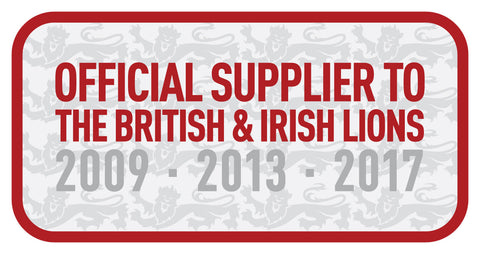Former England legend Martin Johnson talks exclusively about his early days as a player in New Zealand, what it takes to win a British & Irish Lions series, what went wrong in 2005 and what the class of 2017 need to do to succeed
I was only 19 when I went to New Zealand, I’d just come out of age grade England rugby, I’d played a few Leicester first team games but it wasn’t an era when 19 or 20-year-olds were getting into first teams in English rugby. The England team were all late-20s and 30s, it was a different time, young guys weren’t getting the opportunities that they are now.
I was very lucky to get a break to play in the NPC – it was about being in the right place at the right time. I got to play against Argentina at 19 when they were on tour – they had a huge forward pack as they normally do. The provincial teams were so good. Teams like North Harbour were really good, Auckland were the best side in the world – they beat the Wallabies, the Lions and the Springboks, they had about ten All Blacks in that side. And then there was Waikato who contained a lot of reserve All Blacks. I was getting to play regularly against some of the best sides in the world, rather than perhaps being in the Leicester second team. I learnt a lot.
Teams like North Harbour were really good, Auckland were the best side in the world – they beat the Wallabies, the Lions and the Springboks
As a rugby country, New Zealand, was just far more intense when I played there. In the UK, there are pockets of real rugby heartland, but you’re always competing with football. In New Zealand, it might be a smaller country, but the rugby team is what it’s all about.
Wayne Shelford was captain at the time and hadn’t lost a Test match but he got dropped for not winning in the way they should have done. It’s very intense rugby place, the standard of the rugby was a good few levels up on what we had in the UK.
It’s going to be tough in New Zealand – but it’s never been easy, this isn’t a new thing. The advantage touring teams used to have would be that they would be together a long time whereas the home team – even back in 1993 – couldn’t meet up until the Wednesday afternoon before the game. That was the rules, you couldn’t meet up until three days before the game. But now that’s out the window. As the British & Irish Lions that makes it even harder.
Back in the day, people would take the end of the season off and get ready for the Lions tour – that happened in the amateur days. Guys would wind down after the Five Nations and wouldn’t even play a cup final in case they got injured for the Lions tour, but that doesn’t happen now. It makes it tougher.
In 2005, there was a transition happening. That England 2003 team was coming to an end, and probably Clive picked some of his older guys. Some of the Irish and Welsh players were just emerging Ryan Jones came out as a replacement and played very well but I just don’t think we had the players to compete. It was an outstanding All Blacks team, we just didn’t have the personnel to win down there at that point.
If they can do it, they’ll be up with the legends, the guys who’ve done it, they’re the gods of the game – the JPR, the Johns, the Gareths, the Mervyns, Willie John, John Dawes...
It’s obviously another outstanding All Black team this time too. You want the guys that you consider to be world class, to be world class. Then you want some guys who get on that tour and are inspired by it and come through. In 1997, guys like Paul Wallace, Eric Miller, and Jeremy Davidson played some of the best rugby of their lives.
Pace you always want. Look at Stuart Hogg scoring two tries on the first weekend. You talk about cutting edge, guys who can score tries, guys who can beat people, that just makes games winnable if you’ve guys who can do that. For him to do that against Ireland too.
You have to pick the right balance not as a balance of nations, but as a balanced team. I always think the 1997 selection was the best selection in my rugby memory.
They’ve got to survive if they get a couple of defeats early on – because it could happen, but they don’t want to worry about it because it’s ultimately all about the Test matches. It’s always a tough thing to do it, but is it worth the effort? Yes, of course it is. If they can do it, they’ll be up with the legends, the guys who’ve done it, they’re the gods of the game – the JPRs, the Johns, the Gareths, the Mervyns, Willie John, John Dawes... Although I was born, because the game has changed so much, it feels like a different time, a different era.
Look at Jason Robinson in ’01, he’d done it at that level in a different sport but that was quite a risky call and people forget that. He’d not made a Test start at that point, but it paid off, he made the Lions Test team and was outstanding
You want the coach to pick the best team to win, it doesn’t matter where they come from, if it’s 20 English, 20 Welsh, or 20 Scots. In my first team of the week, I picked lots of Scots, the week after it was different. You have to pick the right balance not as a balance of nations, but as a balanced team.
I always think the 1997 selection was the best selection in my rugby memory. They were picking guys from the second division, guys who were coming back from rugby league, England had three scrum-halves on that tour, none of which had started in the Five Nations that season. It was all about the Five Nations before then, if you had a couple of good games you were probably going to go, now there’s Europe to consider, league rugby is a lot more competitive, but if a guy isn’t getting a shout in the national side, it’s still harder to get picked.
There is a chance for people outside the Six Nations. It’s not just about a few games though, some guys have credit in the bank if they’ve been a world class player for five years. That means you know they can do it at the highest level. There’s always a risk in being guys who’ve not done it for that long at that level, but that’s the call you’ve got to make. And it can work too.
Look at Jason Robinson in ’01, he’d done it at that level in a different sport but that was quite a risky call and people forget that. He’d not made a Test start at that point, but it paid off, he made the Lions Test team and was outstanding. Will Greenwood went on a Lions tour without a cap and would’ve made a Test match if he’d not been injured, so there is opportunity.
Very early on, very quickly, they have to come together and say, right, the next six weeks of your life we’re all here, we’re all together.
They have to come together as a group, it’s the biggest thing, more than anything on the field. That tour party has to have, within themselves, a determination to be successful. They must really sell themselves completely and fully into winning this tour, there’s no other way. It’d be too hard otherwise. It’s a hard place to go, the midweek games are hard enough when you see who they’ve got. Very early on, very quickly, they have to come together and say, right, the next six weeks of your life we’re all here, we’re all together. Selection is tough. Once you’ve made the call on who’s playing, who’s sitting, who’s in the stand – everyone has to do their job and be fully supportive.
People were writing us off in 1997 – it’s archaic, it’s not going to work in professional era, you’re not even going to win a game
I think they’ve got a better chance than 12 years ago, considering where British and Irish rugby is now. There was a big thing happening 12 years ago and it probably hadn’t been quite recognised by selection. You want players to really step up and show some form to clinch those places, but we’re still a bit away from the Test, so there’s time. I think we’ve got a good chance. Ireland have beaten the All Blacks for the first time ever so their players know what they’re getting into.
Winning is right up there alongside being world champions. People were writing the Lions off in 1997 – it’s archaic, it’s not going to work in professional era, you’re not even going to win a game against the super provinces down there because they’re so much better than you… and they were world champions. They went on to create a record for consecutive test wins after they played us – it started in the third test and ended at Twickenham – it wasn’t a poor Springboks team, it was a good team. To win down there was massive, we were fortunate, we had some rugby leagues who had come back and were tough players, physical backs particularly Scott Gibbs, Allan Bateman and John Bentley. They gave us a hard edge in the backline. It was a very young forward pack really with some guys in their first year of Test rugby, but they raised themselves and played some of the best rugby of their lives over there. Jeremy Davidson, Richard Hill, Tom Smith, Paul Wallace… they all played great.
You have to put your personal goals aside in a way. You’re on a Lions tour and if you win it, all of them will be 2017 British Lions tourists who won in New Zealand. There’s no differentiation between who played this and who played that, they all won the series. That’s the biggest thing about it, if you start getting people who get their heads down because they didn’t make the test team you’re finished. You have to battle through. There’s no guarantee that even if you all play well, you’re going to win. Because it’s the hardest series in the world to win and you only ever get once chance.
Rhino are the official supplier of training balls and supporter balls to the 2017 British & Irish Lions. To view the range, click here.


